
Mental Health Awareness Month raises awareness of trauma and the impact it can have on the physical, emotional, and mental well-being of children, families, and communities. Mental Health Awareness Month was established in 1949 to increase awareness of the importance of mental health and wellness in Americans' lives, and to celebrate recovery from mental illness. Mental health is essential for a person's overall health. Prevention works, treatment is effective, and people can recover from mental disorders and live full and productive lives.
Successful efforts that have raised awareness about the importance of mental health and promoted acceptance, support, prevention and recovery from these mental health conditions include:
- The Affordable Care Act: expands health insurance coverage to approximately 30-million Americans.
- The Community Mental Health Services Block Grant: provides financial assistance to carry out state plans to offer comprehensive community based mental health services to adults with serious mental illnesses and children with serious emotional disturbances.
- Mental Health Parity and Addiction Equity Act of 2008: eliminates the practice of unequal health treatment and improves access to much needed mental health and substance use disorder treatment services through more equitable insurance coverage.
- The Garrett Lee Smith State/Tribal Suicide Prevention Program: facilitates coordination across government agencies and the private sector in the development, implementation, and evaluation of youth suicide prevention.
Mental Health Awareness Month gives all of us a valuable opportunity to celebrate the strides this Nation has made in promoting mental health and increasing the public's knowledge that effective services and support are available.
- Mental Health Statistics
- Image
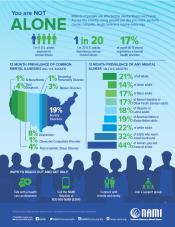
Each year millions of Americans face the reality of living with a mental illness. During May, NAMI (National Alliance of Mental Illness) joins the national movement to raise awareness about mental health. Each year they fight stigma, provide support, educate the public and advocate for policies that support people with mental illness and their families.
It’s important to measure how common mental illness is, so we can understand its physical, social and financial impact and so we can show that no one is alone. These numbers are also powerful tools for raising public awareness, stigma-busting and advocating for better health care. According to the NAMI website, in 2020 these facts were true:
1 in 5 U.S. adults experience mental illness each year (52.9 million people)
1 in 20 U.S. adults experience serious mental illness each year (14.2 million people)
1 in 6 U.S. youth aged 6-17 experience a mental health disorder each year (7.7 million people)
50% of all lifetime mental illness begins by age 14, and 75% by age 24
Suicide is the leading cause of death among people aged 10-14
6.7% of all U.S. adults experience a co-occuring substance use disorder and mental illness (17 million people)
To see more mental health statistics, such as: a demographic breakdown of mental illness, mental illness stats by condition, and mental illness treatment statistics, check out the NAMI Mental Health by Numbers page.
- Support
If you or someone you know is struggling with mental health, you are not alone. There are many supports, services, and treatment options that are available and may help.
Support Groups are often peer led and can offer participants the opportunity to share their own experiences and gain support from other attendees. Many people find peer support a helpful tool that can aid in their recovery. There are a variety of organizations that offer support groups for consumers, their family members and friends. For more information and resources about Specialized Support Groups check out MHA (Mental Health America) Support Group website.
Image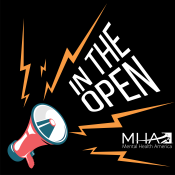
NAMI Help Line is a free, nationwide peer-support service providing information, resource referrals and support to people living with a mental health condition, their family members and caregivers, mental health providers and the public. HelpLine staff and volunteers are experienced, well-trained and able to provide guidance. The NAMI HelpLine is not a hot line, crisis line or suicide prevention line. If you or someone you know is experiencing a crisis, please see the resources available on the NAMI Help Line website.
Blogs/Webinars/Podcasts are available for free on the MHA website. There are several recorded podcasts that can be accessed on their In The Open Podcast page. With a wide range of topics, such as: Depression in Fathers, Breaking Up With a Toxic Person, I Hold Grudges, etc. You can register and participate in live webinars for free. Or you can watch recordings from previous webinars on their MHA Webinar page. To read articles and posts by MHA staff, volunteers, affiliates, partners, and networks make sure to check out their Chiming In blog.
- Reading Material
It is never too early to start talking about mental health and the importance it can play in our lives. Here are a few recommendations for youth about mental health.
Image
Balloons for Papa by Elizabeth Bedia
E BEDIA
A perfect book to help discuss mental health, depression, empathy, loss, and hope with young children. Arthur's gloomy father rushes him through the park every morning, through gray and rainy weather. Arthur just wants a bright balloon from the park's vendor, but Papa always says no. Brimming with affecting and poignant words, beautiful black and white illustrations, and bursts of color on every page.
Image
Iveliz Explains it All by Andrea Beatriz Arango
JFICTION ARANGO
How do you speak up when it feels like no one is listening? One girl takes on seventh grade while facing mental health challenges, and must find her voice to advocate for the help and understanding she deserves. No matter how hard Iveliz tries, sometimes people say things that just make her so mad. And worse, Mimi keeps saying Iveliz's medicine is unnecessary even though it helps Iveliz feel less sad. But how do you explain your feelings to others when you're not even sure what's going on yourself?
Image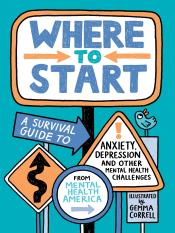
YA 618. 9289 WHE 2023
It can be extremely hard to figure out what’s going on in our own heads when we are suffering when we feel alone and unworthy and can’t stop our self-critical inner voice. And it’s even more difficult to know where to go for answers. This book is a perfect first step. Here you’ll find clear, honest, reassuring information about all the most common mental illnesses and what you can do to find help and to practice self-care.These books can be found in our adult collection. Though all of these books are meant to be read by adults 18+, some of them are for the benefit of children, simply put, parenting books.
Image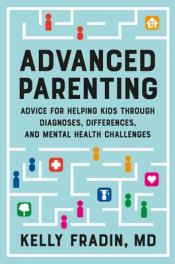
649.15 FRA 2023
Any parent who has ever walked out of a concerning appointment with their child's doctor or teacher has experienced a heady mix of emotions--fear, love, confusion, concern, sadness, and perhaps even anger. While every parent hopes for a healthy child, the reality is that children face many common challenges, including medical issues. Advanced Parenting will help families from the beginning of their journey, helping parents to decide when a child needs help, accepting the implications of a challenge, obtaining a correct diagnosis, learning about the issue, building a treatment team and coming up with a comprehensive plan.
Image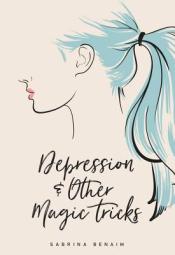
Depression and Other Magic Tricks by Sabrina Benaim
FICTION BENAIM, S. 2017
This debut book, Depression & Other Magic Tricks explores themes of mental health, love, and family. It is a documentation of struggle and triumph, a celebration of daily life and of living. Benaim's wit, empathy, and gift for language produce a work of endless wonder. Sabrina Benaim, one of the most-viewed performance poets of all time, whose poem "Explaining My Depression to My Mother" has become a cultural phenomenon with over 5,000,000 views.
Image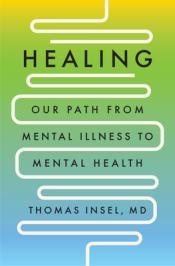
Healing: Our Path From Mental Illness to Mental Health by Thomas Insel
362.20973 INS 2022
In the United States, we have treatments that work, but our system fails at every stage to deliver care well. Even before COVID, mental illness was claiming a life every eleven minutes by suicide. Quality of care varies widely, and much of the field lacks accountability. We focus on drug therapies for symptom reduction rather than on plans for long-term recovery. Care is often unaffordable and unavailable, particularly for those who need it most and are homeless or incarcerated. Where was the justice for the millions of Americans suffering from mental illness? Who was helping their families?